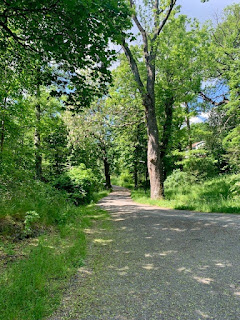Walking on Djurgården
 |
| Forested trails... |
Most major cities have a large park area within the city that attracts visitors and locals alike... Central Park, Tiergarten and Hyde Park are good examples. In Stockholm, we have Djurgården. Djurgården is both the name of the island as well as the park that takes up both the island and part of the mainland, all which is part of a larger park system: The Royal National City Park. This is a green belt that covers most of the north-east area of the city and is the first ever national city park in the world.
 |
| ...and busy waterways. |
One great activity to do on a sunny day is to take yourself out to the far eastern edge of the island and then walk back to town. While you can take a bus there, I prefer taking one of the commuter boats (#80 from Nybroplan) in the summertime. The pier at the end of the island is called Blockhusudden and, from here, you can make your way back to the city at a leisurely place on the route of your choice. When you are at Blockhusudden, don't miss a wonderful art museum there called Thiel Gallery (Thielska Galleriet).
 |
| Lunch at Blockhusudden |
The route back, that I chose for my recent walk, cut across the island, through forested trails, past the Isbladsskärret wetlands to the Djurgård canal which separates the island from the mainland. You can then follow the canal all the way back to the city. I would say that the walk takes around 1½ to 2 hours, depending on your pace, route and whether you make a pit stop for ice cream. The walk is by no means strenuous... all flat with well marked paths.
 |
| Isbladsskärret with nesting herons |
The forest trail we took is actually named the Crown Princess Victoria and Prince Daniel Lovers' Path ("kärleksstig"). Cute. The wetlands (Isbladsskärret) we passed are worth the trip out on its own, especially for bird lovers. While passing by, we could see several herons both nesting and flying over the water. Djurgården is also well known for its beautiful, old oak trees and the island has historically contributed a lot of timber for the Swedish navy (including for the royal warship Vasa).
 |
| Mighty oaks! |
The Djurgård canal is narrow at most points and there are four bridges that connect it to the mainland, so you can choose which side of the canal to walk along. The paths along the canal are quite popular with Stockholmers who use them to walk, jog, bike and even ride their horses. The canal itself is popular with boaters and kayakers. You can travel on the canal yourself by taking the sightseeing Royal Canal Tour.
 |
| Djurgård canal. |
So, make sure you take advantage of the summer weather and beautiful, accessible nature by visiting Djurgården and walking beyond the tourist attractions. With that being said, Djurgården can be visited year round and each season has its charm and beauty. For comparison, click here for an article about Djurgården in the fall and then here for my walk on the island this past winter.




Comments
Post a Comment